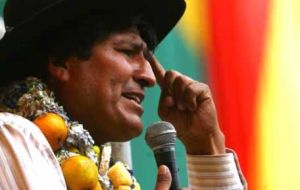MercoPress. South Atlantic News Agency
Bolivia agrees vote on new constitution referendum
 Pte. Evo Morales can stay in office until 2014
Pte. Evo Morales can stay in office until 2014 Bolivian president Evo Morales reached a deal with opposition politicians to hold a referendum on a new constitution after agreeing to limit himself to running for only one more term in office.
The agreement was reached late on Monday after Morales led a march of more than 100,000 of his supporters on Congress in the capital La Paz. "Four political parties agreed to make the ratification of the constitution possible, the referendum to approve the constitutional draft will take place on January 25" Morales told thousands of cheering supporters. The new constitution, which would give more power to Bolivia's indigenous majority, has been the subject of violent protests by the country's opposition. The new constitution would allow Morales to seek re-election in 2009 but forbids him from seeking a third term in 2014. Morales had joined the last stage of the week-long 200 kilometres march in favour of the constitution by peasant farmers, activists and miners as it entered La Paz. The agreement comes after strong pressure from Unasur, Union of South American Nations, and the OAS, Organization of American States, which acted as facilitators of the conflict which at several points turned particularly nasty. Violence broke out over the proposals last month, leaving 19 people dead and martial law imposed by the government in one province. Rioting and acts of vandalism interrupted for short periods the supply of Bolivia's main export and income, natural gas. Neighbouring countries warned the strong autonomous movement in several Bolivian provinces that they would only continue to recognize the legitimate elected government of President Morales. Bolivia's constitutional court had rejected a decree Morales had issued calling for a December referendum on his new constitution, saying such a move could only be scheduled by congress. The move led to the protests by rural workers and union members backing Morales. The proposed constitution redistributes land and tax revenue to Bolivia's poor indigenous communities, but has met fierce resistance from provinces in the east of the country, who say it overlooks their demands for greater regional autonomy. OAS Secretary General Jose Miguel Insulza said the agreement was "evidence of flexibility and dialogue, the only instruments to solve political crisis no matter how tough they can be". Insulza praised government and opposition for their determination in reaching an agreement to overcome confrontation based on institutional continuity and no resorting to violence. However he cautioned that the agreement needs the full support of all parties "to avoid the repeat of tense situations in Bolivia". OAS and Unasur delegates were present at the latest rounds of negotiations. "Democracy in Bolivia and Latinamerica have gone through difficult moments, but she came out strengthened and OAS congratulates itself for having been present next to the players, who through dialogue have overcome the situation", emphasized Insulza,




Top Comments
Disclaimer & comment rulesCommenting for this story is now closed.
If you have a Facebook account, become a fan and comment on our Facebook Page!